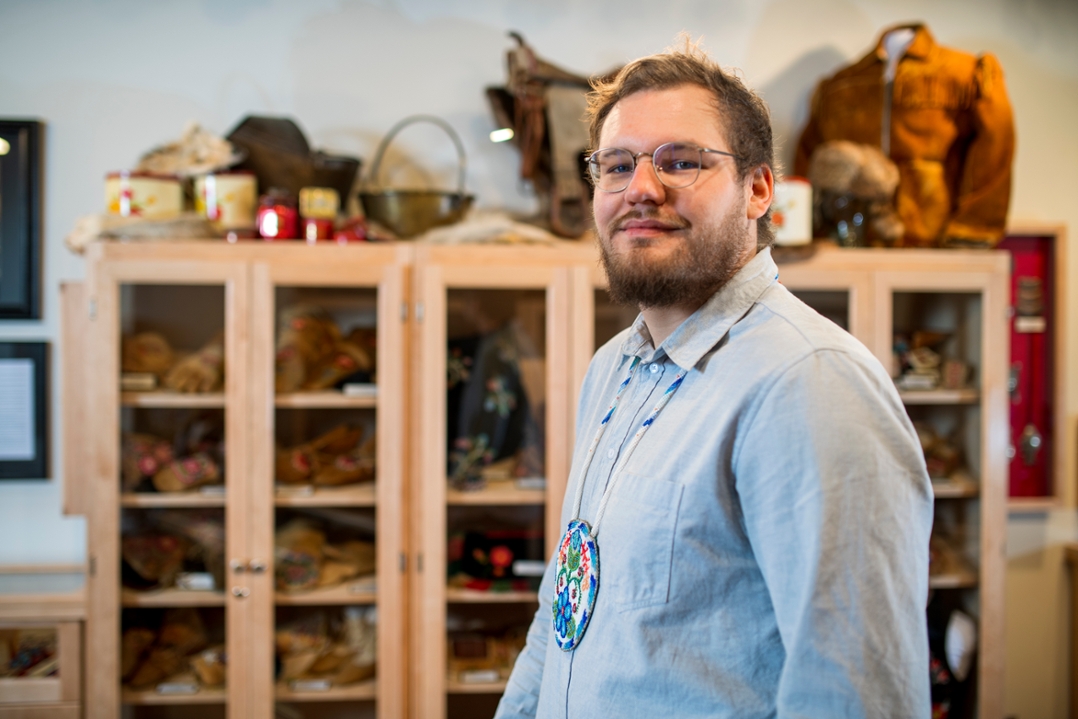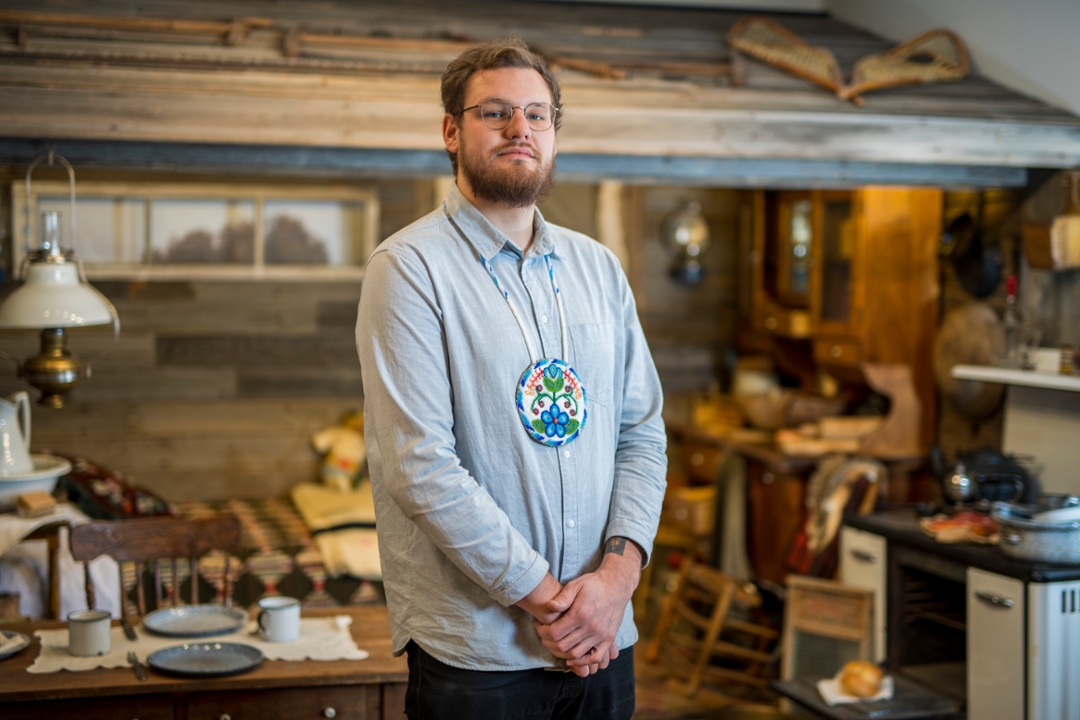
Envisioning a better future
Justin Wiebe is forging a new path for Indigenous youth in Canada
By Ashleigh MatternJustin Wiebe has a calling: He wants to see Indigenous people flourish in Canada.
“My vision for the future is one where everyone in the country has an equal opportunity to be their full selves,” said Wiebe (BEd’12).
One of the ways he is fulfilling his vision is by working in organizations that are making a difference.
He currently works for the Mastercard Foundation, helping to build a program called EleV that focuses on improving Indigenous education outcomes across the country.
He’s also a board member on the Circle on Philanthropy of the Aboriginal Peoples of Canada, and a former co-chair of the Canadian Roots Exchange, a national Indigenous youth-led charity focused on reconciliation.
Wiebe said this calling goes back to the experiences he had in the Saskatchewan Urban Native Teacher Education Program (SUNTEP), a four-year program designed for Métis students who want to become teachers.
“We spent a lot of time in the community and learning not just about our realities, but the histories and realities of other people,” Wiebe said.
Through those experiences, he realized that attending a post-secondary institution wasn’t an opportunity many Indigenous people had. Even in his own immediate family, he was the first to go to university.
He wanted to help make that experience possible for others, but he soon realized that following this mission also meant deviating from the path ahead of him as a teacher.
“I realized that individual level support and change is so important, but if we want to see a truly better future, we need to take a systems change approach,” he said. “Developing solutions to the challenges our communities face is complex and will take time.”
Co-creating a better future
The Mastercard Foundation’s EleV program aims to tackle some of those complex problems Wiebe would like to see solved.
The program partners with Indigenous communities and post-secondary institutions to create programs that support Indigenous education and employment.
They’re currently working with Vancouver Island University, Yukon College and the University of Lethbridge and Wiebe said the program is expanding with new partners across the country.
The work is still new for the foundation and it’s evolving, but he said he is excited about the model behind the program and the possibilities in the future.
“The way we do the work is unique in the philanthropic space,” he said. “What grounds us is relationship and co-creation — everything we do is built on deep and meaningful relationships with partners within Indigenous communities.”
The solutions are designed and led by Indigenous people, and the programming reflects Indigenous traditions, values, and aspirations, Wiebe said.
“I spend a lot of time in communities building relationships, facilitating conversations with Indigenous leaders, young people, and other partners to identify the challenges Indigenous young people face and develop solutions to tackle those challenges,” he said.
A foundation for success
The connection between his current work and his education through SUNTEP may seem tenuous, but Wiebe said his experience at USask was “critical” to his current career path.
“I draw on a lot of the experiences and skills in the program, particularly around facilitation,” he said. “I might not be in front of a room of Grade 9 students, but I'm working with a range of partners, young people, elders, and leaders of communities and institutions to support facilitation, to have conversations, to get to ideas and projects that impact the lives of Indigenous young people in this country.”
He said he also developed deep relationships with faculty and staff, and he said some of his closest friends today are people he met through SUNTEP and the broader Indigenous community at USask.
“SUNTEP and the Gabriel Dumont Institute and the Aboriginal Students Centre were foundational for my personal development. I learned a ton about my own history, my family’s history. These were an important source of pride for me and reshaped the way I looked at the world.”

Instilling pride in young Métis people
That connection to his Métis ancestry was one of the inspirations behind Mamawi Project, an endeavour Wiebe co-founded.
“This project was the culmination of a lot of conversations I've had with Métis people from across our homelands,” he said.
He said it came out of the idea that more needs to be done to elevate the stories and leadership of Indigenous youth — but they wanted those stories to be told by those young people.
As a result of the Truth and Reconciliation Commission, he said there was a growing interest in the stories of Indigenous people, and he and the other founders of the Mamawi Project wanted to ensure young Métis people were included.
“We needed to do something. It’s not solely the responsibility of Canada or Canadian organizations or our own political organizations — we believe in Métis young people leading this work.”
They want to celebrate the work Métis people are doing and deepen the relationships and connections between Métis people.
“We’re a big nation — our territory covers vast distances — so we might not always have those connections.”
The project has a digital focus, sharing language and celebrating the stories of Métis people through social media.
It’s not solely online, though. In 2019, a group of about 20 Métis youth from across Canada gathered in Saskatoon as part of the Journeying Home Gathering. The group spent a week learning from Métis elders and knowledge keepers, and visiting historically significant places, before attending Back to Batoche Days, an annual celebration of Métis heritage in Batoche, Sask.
The Mamawi Project is also launching a zine in the new year on the theme of “visiting,” or kîyokêwin, a concept shared by Métis Elder Maria Campbell.
“We’re looking at visiting as a framework for how we as Métis people rebuild our communities,” Wiebe said. “We want to instil pride in Métis young people that who we are is something to be proud about, our history, culture, values, languages."
“There’s so much further to go.”
Wiebe said he puts a lot of energy into his work, but he said he gets just as much out of it.
“For me, it’s about giving back. It’s about utilizing the experience, the skills, the privilege that I have both from an educational perspective and others. I can put those skills and experience to use to support organizations with missions and values I believe in.”
Programs like EleV and the work that The Mamawi Project is doing are only two examples of exciting endeavours that are aiming to make a difference for Indigenous people.
But Wiebe is realistic about the work ahead of him if he is to realize his dreams.
“Lots of positive things have happened and continue to happen thanks to generations of activism and hard work by Indigenous leaders, but as far as we’ve come there’s so much further to go. Kids are still being taken from their families, languages are still being lost, people are facing racism on a daily basis. There’s so much further to go. So let’s get to work.”


